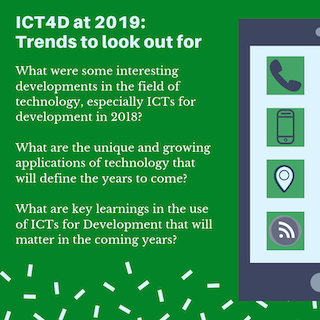As we step into 2019 in earnest, it is time for some reflection: What were some interesting developments in the field of technology, especially ICTs, for development in 2018? What are the most unique and growing applications of technology that will define the years to come? And finally, what are some key learnings of ICTs for Development that we should keep in mind as we go along?

Noteworthy developments from the recent past
- Vernacular tech is growing, but more is needed to make the content localised, relevant and optimised for minimum usage of data or space without compromising on quality. Ankur Capital writes on this key trend: https://www.ankurcapital.com/post/vernacular-tech-changing-business-landscape-in-india-for-next-billion-users
- Even as data usage grows, offline sharing of apps, content and files is a trend that is popular among semi-urban and rural areas of India that are still in the shadows of reliable mobile data connectivity. Arundhati Ramanathan writes for The Ken on how Google is trying to tap into P2P sharing of apps, currently dominated by SHAREit (the piece requires sign-up to read): https://the-ken.com/story/google-wants-its-share-of-shareits-sideloading-pie/
- An interesting new development is that of vernacular ‘conversational agents’ to address the needs of people with low literacy and technology experience for credible information and counsel on various topics. Read about Farm Chat, a conversational agent in Hindi for farmers: https://homes.cs.washington.edu/~mohitj/pdfs/j2-imwut-2018.pdf
- Satellite imaging, IoT and big data for improving farm yields, strengthening climate change resilience, agriculture financing, insurance, etc. Check out Oxen Farms, an IIT Kanpur incubated start-up that incorporates these technologies in farms across central and northern states of India.
- There is growing deployment of technology and media for ensuring rights, with their role in contributing to transparency and accountability becoming centre stage. Read our colleague Orlanda Ruthven’s article on The Wire on our platform Saajha Manch, which provides a database of accounts by workers in NCR of the kinds of violation and enforcement failure encountered daily.
- Children from low-income families often end up trailing behind in schools because their parents, often with limited education themselves, are unable to help the children with early education. Start-ups such as Saarthi Education and Dost Education are leveraging simple ICTs to equip parents to better engage in their children’s early education and development.
- Technology is not good or bad in and of itself, but any technology can be misused if we don’t put in place robust structures for its use and governance. Read what our co-founder Aaditeshwar Seth has to say about ensuring responsible outcomes from technology, including some possible governance structures to explore: http://www.cse.iitd.ernet.in/~aseth/processes-to-manage-technology.pdf
- Even as we herald the coming-of-age of mobile technologies in India, there’s a substantial gap in people’s access to and ability to tap the multiple benefits it can offer, especially among women. This paper from Harvard Kennedy School examines the intersections between economic and normative barriers that influence women’s ownership of mobile phones – and therefore will influence how we develop programmes to engage and benefit women.
- Does access to technology mean its benefits can be realised? Our experience showed that there’s more to it – technology adoption doesn’t happen instantaneously. Skill building through offline methods is crucial here, and these need to be low-cost methods. Read about how we can build stable, self-governing and reproducible structures in offline skilling – based on our experience with Mobile Vaani’s strategy of creating volunteer clubs: http://www.cse.iitd.ernet.in/~aseth/camera-ready-1598-4953-1-PB.pdf
- With our project JEEViKA Mobile Vaani, we managed to bring in women who didn’t have access to, or regularly use, mobile phones and shared messages on improving maternal nutrition. Here is a paper that was presented at Information and Communication
Technologies and Development (ICTD) 2019 on our experiences in building technology adoption among women through this project: http://www.cse.iitd.ernet.in/~aseth/genderNtechICTD19-1909-01.pdf



